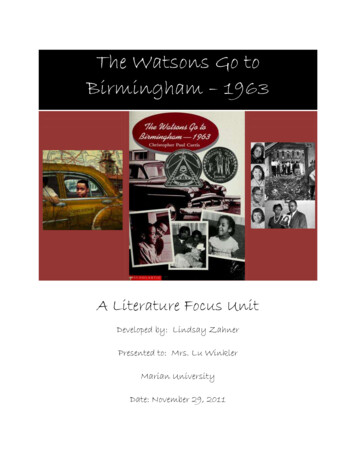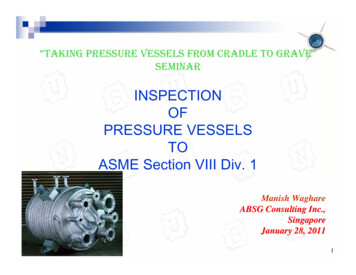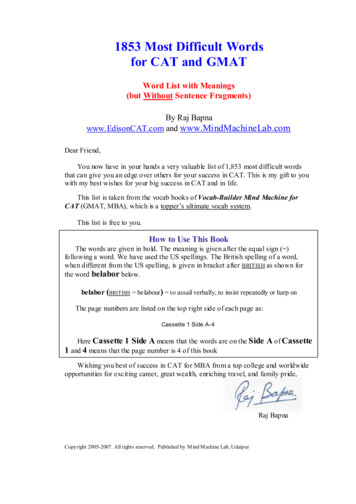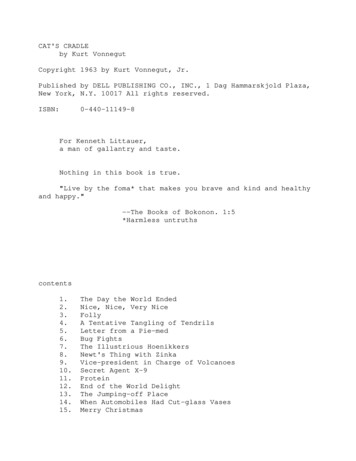
Transcription
CAT'S CRADLEby Kurt VonnegutCopyright 1963 by Kurt Vonnegut, Jr.Published by DELL PUBLISHING CO., INC., 1 Dag Hammarskjold Plaza,New York, N.Y. 10017 All rights reserved.ISBN:0-440-11149-8For Kenneth Littauer,a man of gallantry and taste.Nothing in this book is true."Live by the foma* that makes you brave and kind and healthyand happy."--The Books of Bokonon. 1:5*Harmless 5.The Day the World EndedNice, Nice, Very NiceFollyA Tentative Tangling of TendrilsLetter from a Pie-medBug FightsThe Illustrious HoenikkersNewt's Thing with ZinkaVice-president in Charge of VolcanoesSecret Agent X-9ProteinEnd of the World DelightThe Jumping-off PlaceWhen Automobiles Had Cut-glass VasesMerry Christmas
9.50.51.52.53.54.55.56.57.58.59.60.61.Back to KindergartenThe Girl PoolThe Most Valuable Commodity on EarthNo More MudIce-nineThe Marines March OnMember of the Yellow PressThe Last Batch of BrowniesWhat a Wampeter IsThe Main Thing About Dr. HoenikkerWhat God IsMen from MarsMayonnaiseGone, but Not ForgottenOnly SleepingAnother BreedDynamite MoneyAn Ungrateful ManVin-ditHobby ShopMeowA Modem Major GeneralBarracuda Capital of the WorldFata MorganaHouse of Hope and MercyA Karass Built for TwoBicycles for AfghanistanThe DemonstratorCommunist SympathizersWhy Americans Are HatedThe Bokononist Method for Handling CaesarDynamic TensionJust Like Saint AugustineA Fish Pitched Up by an Angry SeaA Nice MidgetO.K., MomNo PainThe President of Fabri-TekCommunists, Nazis, Royalists,Parachutists, and Draft DodgersNever Index Your Own BookA Self-supporting Squirrel CageThe Queasy DreamTyranny with a DifferenceFasten Your Seat BeltsAn Underprivileged NationWhat a Corporal Was Worth
5.96.97.98.99.100.101.102.103.104.105.106.Why Hazel Wasn't ScaredReverent and FreePeace and PlentyA Good Time to Come to San LorenzoThe Strongest Thing There IsHy-u-o-ook-kuh!Hoon-yera Mora-toorzA Big MosaicTutored by BokononThe Happiness of Being an AmericanThe Pissant HiltonBlack DeathCat's CradleGive My Regards to Albert SchweitzerJulian Castle Agrees with Newtthat Everything Is MeaninglessAspirin and Boko-maruRing of SteelWhy McCabe's Soul Grew CoarseThe Waterfall StrainersA White Bride for the Son of a Pullman PorterZah-mah-ki-boDr. Schlichter von Koenigswald Approachesthe Break-even PointBlackoutA Pack of FomaTwo Little JugsThe Cut of My JibWhy Frank Couldn't Be PresidentDuffleOnly One CatchMonaOn the Poet's Celebration of his First Boko-maruHow I Almost Lost My MonaThe Highest MountainI See the HookBell, Book, and Chicken in a HatboxThe Stinking ChristianLast RitesDyot meet matDown the Oubliette Goes FrankLike My Predecessors, I Outlaw BokononEnemies of FreedomA Medical Opinion on the Effects of a Writers' StrikeSulfathiazolePain-killerWhat Bokononists Say When They Commit Suicide
9.120.121.122.123.124.125.126.127.Feast Your Eyes!Frank Tells Us What to DoFrank Defends HimselfThe Fourteenth BookTime OutNewt's Mother's ReticuleHistoryWhen I Felt the Bullet Enter My HeartAs It HappenedThe Grand Ah-whoomSanctuaryThe Iron Maiden and the OublietteMona Thanks MeTo Whom It May ConcernI Am Slow to AnswerThe Swiss Family RobinsonOf Mice and MenFrank's Ant FarmThe TasmaniansSoft Pipes, Play OnThe Endcat's cradleThe Day the World Ended 1Call me Jonah. My parents did, or nearly did. They called meJohn.Jonah – John - if I had been a Sam, I would have been a Jonahstill, not because I have been unlucky for others, but becausesomebody or something has compelled me to be certain places atcertain times, without fail. Conveyances and motives, bothconventional and bizarre, have been provided. And, according toplan, at each appointed second, at each appointed place this Jonahwas there.Listen:
When I was a younger man--two wives ago, 250,000 cigarettesago, 3,000 quarts of booze ago.When I was a much younger man, I began to collect materialfor a book to be called The Day the World Ended.The book was to be factual.The book was to be an account of what important Americans haddone on the day when the first atomic bomb was dropped onHiroshima, Japan.It was to be a Christian book. I was a Christian then.I am a Bokononist now.I would have been a Bokononist then, if there had been anyoneto teach me the bittersweet lies of Bokonon. But Bokononism wasunknown beyond the gravel beaches and coral knives that ring thislittle island in the Caribbean Sea, the Republic of San Lorenzo.We Bokononists believe that humanity is organized into teams,teams that do God's Will without ever discovering what they aredoing. Such a team is called a karass by Bokonon, and theinstrument, the kan-kan, that brought me into my own particularkarass was the book I never finished, the book to be called TheDay the World Ended.Nice, Nice, Very Nice 2"If you find your life tangled up with somebody else's lifefor no very logical reasons," writes Bokonon, "that person may bea member of your karass."At another point in The Books of Bokonon he tells us, "Mancreated the checkerboard; God created the karass." By that hemeans that a karass ignores national, institutional, occupational,familial, and class boundaries.It is as free-form as an amoeba.In his "Fifty-third Calypso," Bokonon invites us to singalong with him:Oh, a sleeping drunkardUp in Central Park,And a lion-hunter
In the jungle dark,And a Chinese dentist,And a British queen-All fit togetherIn the same machine.Nice, nice, very nice;Nice, nice, very nice;Nice, nice, very nice-So many different peopleIn the same device.Folly 3Nowhere does Bokonon warn against a person's trying todiscover the limits of his karass and the nature of the work GodAlmighty has had it do. Bokonon simply observes that suchinvestigations are bound to be incomplete.In the autobiographical section of The Books of Bokanon hewrites a parable on the folly of pretending to discover, tounderstand:I once knew an Episcopalian lady in Newport, Rhode Island,who asked me to design and build a doghouse for her Great Dane.The lady claimed to understand God and His Ways of Workingperfectly. She could not understand why anyone should be puzzledabout what had been or about what was going to be.And yet, when I showed her a blueprint of the doghouse Iproposed to build, she said to me, "I'm sorry, but I never couldread one of those things.""Give it to your husband or your minister to pass on to God,"I said, "and, when God finds a minute, I'm sure he'll explain thisdoghouse of mine in a way that even you can understand."She fired me. I shall never forget her. She believed that Godliked people in sailboats much better than He liked people inmotorboats. She could not bear to look at a worm. When she saw aworm, she screamed.
She was a fool, and so am I, and so is anyone who thinks hesees what God is Doing, [writes Bokonon].A Tentative Tangling of Tendrils 4Be that as it may, I intend in this book to include as manymembers of my karass as possible, and I mean to examine all stronghints as to what on Earth we, collectively, have been up to.I do not intend that this book be a tract on behalf ofBokononism. I should like to offer a Bokononist warning about it,however. The first sentence in The Books of Bokonon is this:"All of the true things I am about to tell you are shamelesslies."My Bokononist warning is this:Anyone unable to understand how a useful religion can befounded on lies will not understand this book either.So be it.About my karass, then.It surely includes the three children of Dr. Felix Hoenikker,one of the so-called "Fathers" of the first atomic bomb. Dr.Hoenikker himself was no doubt a member of my karass, though hewas dead before my sinookas, the tendrils of my life, began totangle with those of his children.The first of his heirs to be touched by my sinookas wasNewton Hoenikker, the youngest of his three children, the youngerof his two sons. I learned from the publication of my fraternity,The Delta Upsilon Quarterly, that Newton Hoenikker, son of theNobel Prize physicist, Felix Hoenikker, had been pledged by mychapter, the Cornell Chapter.So I wrote this letter to Newt:"Dear Mr. Hoenikker:"Or should I say, Dear Brother Hoenikker?"I am a Cornell DU now making my living as a freelancewriter. I am gathering material for a book relating to the firstatomic bomb. Its contents will be limited to events that took
place on August 6, 1945, the day the bomb was dropped onHiroshima."Since your late father is generally recognized as havingbeen one of the chief creators of the bomb, I would very muchappreciate any anecdotes you might care to give me of life in yourfather's house on the day the bomb was dropped."I am sorry to say that I don't know as much about yourillustrious family as I should, and so don't know whether you havebrothers and sisters. If you do have brothers and sisters, Ishould like very much to have their addresses so that I can sendsimilar requests to them."I realize that you were very young when the bomb wasdropped, which is all to the good. My book is going to emphasizethe human rather than the technical side of the bomb, sorecollections of the day through the eyes of a 'baby,' if you'llpardon the expression, would fit in perfectly."You don't have to worry about style and form. Leave all thatto me. Just give me the bare bones of your story."I will, of course, submit the final version to you for yourapproval prior to publication."Fraternally yours."Letter from a Pre-med 5To which Newt replied:"I am sorry to be so long about answering your letter. Thatsounds like a very interesting book you are doing. I was so youngwhen the bomb was dropped that I don't think I'm going to be muchhelp. You should really ask my brother and sister, who are botholder than I am. My sister is Mrs. Harrison C. Conners, 4918 NorthMeridian Street, Indianapolis, Indiana. That is my home address,too, now. I think she will be glad to help you. Nobody knows wheremy brother Frank is. He disappeared right after Father's funeraltwo years ago, and nobody has heard from him since. For all weknow, he may be dead now."I was only six years old when they dropped the atomic bombon Hiroshima, so anything I remember about that day other peoplehave helped me to remember.
"I remember I was playing on the living-room carpet outsidemy father's study door in Ilium, New York. The door was open, andI could see my father. He was wearing pajamas and a bathrobe. Hewas smoking a cigar. He was playing with a loop of string. Fatherwas staying home from the laboratory in his pajamas all day thatday. He stayed home whenever he wanted to."Father, as you probably know, spent practically his wholeprofessional life working for the Research Laboratory of theGeneral Forge and Foundry Company in Ilium. When the ManhattanProject came along, the bomb project, Father wouldn't leave Iliumto work on it. He said he wouldn't work on it at all unless theylet him work where he wanted to work. A lot of the time that meantat home. The only place he liked to go, outside of Ilium, was ourcottage on Cape Cod. Cape Cod was where he died. He died on aChristmas Eve. You probably know that, too."Anyway, I was playing on the carpet outside his study on theday of the bomb. My sister Angela tells me I used to play withlittle toy trucks for hours, making motor sounds, going 'burton,burton, burton' all the time. So I guess I was going 'burton,burton, burton,' on the day of the bomb; and Father was in hisstudy, playing with a loop of string."It so happens I know where the string he was playing withcame from. Maybe you can use it somewhere in your book. Fathertook the string from around the manuscript of a novel that a manin prison had sent him. The novel was about the end of the worldin the year 2000, and the name of the book was 2000 A.D. It toldabout how mad scientists made a terrific bomb that wiped out thewhole world. There was a big sex orgy when everybody knew that theworld was going to end, and then Jesus Christ Himself appeared tenseconds before the bomb went off. The name of the author wasMarvin Sharpe Holderness, and he told Father in a covering letterthat he was in prison for killing his own brother. He sent themanuscript to Father because he couldn't figure out what kind ofexplosives to put in the bomb. He thought maybe Father could makesuggestions."I don't mean to tell you I read the book when I was six. Wehad it around the house for years. My brother Frank made it hispersonal property, on account of the dirty parts. Frank kept ithidden in what he called his 'wall safe' in his bedroom. Actually,it wasn't a safe but just an old stove flue with a tin lid. Frankand I must have read the orgy part a thousand times when we werekids. We had it for years, and then my sister Angela found it. Sheread it and said it was nothing but a piece of dirty rotten filth.She burned it up, and the string with it. She was a mother toFrank and me, because our real mother died when I was born."My father never read the book, I'm pretty sure. I don'tthink he ever read a novel or even a short story in his whole
life, or at least not since he was a little boy. He didn't readhis mail or magazines or newspapers, either. I suppose he read alot of technical journals, but to tell you the truth, I can'tremember my father reading anything."As I say, all he wanted from that manuscript was the string.That was the way he was. Nobody could predict what he was going tobe interested in next. On the day of the bomb it was string."Have you ever read the speech he made when he accepted theNobel Prize? This is the whole speech: 'Ladies and Gentlemen. Istand before you now because I never stopped dawdling like aneight-year-old on a spring morning on his way to school. Anythingcan make me stop and look and wonder, and sometimes learn. I am avery happy man. Thank you.'"Anyway, Father looked at that loop of string for a while,and then his fingers started playing with it. His fingers made thestring figure called a 'cat's cradle.' I don't know where Fatherlearned how to do that. From his father, maybe. His father was atailor, you know, so there must have been thread and string aroundall the time when Father was a boy."Making the cat's cradle was the closest I ever saw my fathercome to playing what anybody else would call a game. He had no useat all for tricks and games and rules that other people made up.In a scrapbook my sister Angela used to keep up, there was aclipping from Time magazine where somebody asked Father whatgames he played for relaxation, and he said, 'Why should I botherwith made-up games when there are so many real ones going on?'"He must have surprised himself when he made a cat's cradleout of the string, and maybe it reminded him of his own childhood.He all of a sudden came out of his study and did something he'dnever done before. He tried to play with me. Not only had he neverplayed with me before; he had hardly ever even spoken to me."But he went down on his knees on the carpet next to me, andhe showed me his teeth, and he waved that tangle of string in myface. 'See? See? See?' he asked. 'Cat's cradle. See the cat'scradle? See where the nice pussycat sleeps? Meow. Meow.'"His pores looked as big as craters on the moon. His ears andnostrils were stuffed with hair. Cigar smoke made him smell likethe mouth of Hell. So close up, my father was the ugliest thing Ihad ever seen. I dream about it all the time."And then he sang. 'Rockabye catsy, in the tree top'; hesang, 'when the wind blows, the cray-dull will rock. If the boughbreaks, the cray-dull will fall. Down will come craydull, catsyand all.'"I burst into tears. I jumped up and I ran out of the houseas fast as I could go.
"I have to sign off here. It's after two in the morning. Myroommate just woke up and complained about the noise from thetypewriter."Bug Fights 6Newt resumed his letter the next morning. He resumed it asfollows:"Next morning. Here I go again, fresh as a daisy after eighthours of sleep. The fraternity house is very quiet now. Everybodyis in class but me. I'm a very privileged character. I don't haveto go to class any more. I was flunked out last week. I was a premed. They were right to flunk me out. I would have made a lousydoctor."After I finish this letter, I think I'll go to a movie. Orif the sun comes out, maybe I'll go for a walk through one of thegorges. Aren't the gorges beautiful? This year, two girls jumpedinto one holding hands. They didn't get into the sorority theywanted. They wanted Tri-Delt."But back to August 6, 1945. My sister Angela has told memany times that I really hurt my father that day when I wouldn'tadmire the cat's cradle, when I wouldn't stay there on the carpetwith my father and listen to him sing. Maybe I did hurt him, but Idon't think I could have hurt him much. He was one of the bestprotected human beings who ever lived. People couldn't get at himbecause he just wasn't interested in people. I remember one time,about a year before he died, I tried to get him to tell mesomething about my mother. He couldn't remember anything abouther."Did you ever hear the famous story about breakfast on theday Mother and Father were leaving for Sweden to accept the NobelPrize? It was in The Saturday Evening Post one time. Mother cookeda big breakfast. And then, when she cleared off the table, shefound a quarter and a dime and three pennies by Father's coffeecup. He'd tipped her."After wounding my father so terribly, if that's what I did,I ran out into the yard. I didn't know where I was going until Ifound my brother Frank under a big spiraea bush. Frank was twelve
then, and I wasn't surprised to find him under there. He spent alot of time under there on hot days. Just like a dog, he'd make ahollow in the cool earth all around the roots. And you never couldtell what Frank would have under the bush with him. One time hehad a dirty book. Another time he had a bottle of cooking sherry.On the day they dropped the bomb Frank had a tablespoon and aMason jar. What he was doing was spooning different kinds of bugsinto the jar and making them fight."The bug fight was so interesting that I stopped crying rightaway--forgot all about the old man. I can't remember what allFrank had fighting in the jar that day, but I can remember otherbug fights we staged later on: one stag beetle against a hundredred ants, one centipede against three spiders, red ants againstblack ants. They won't fight unless you keep shaking the jar. Andthat's what Frank was doing, shaking, shaking, the jar."After a while Angela came looking for me. She lifted up oneside of the bush and said, 'So there you are!' She asked Frankwhat he thought he was doing, and he said, 'Experimenting.' That'swhat Frank always used to say when people asked him what hethought he was doing. He always said, 'Experimenting.'"Angela was twenty-two then. She had been the real head ofthe family since she was sixteen, since Mother died, since I wasborn. She used to talk about how she had three children--me,Frank, and Father. She wasn't exaggerating, either. I can remembercold mornings when Frank, Father, and I would be all in a line inthe front hail, and Angela would be bundling us up, treating usexactly the same. Only I was going to kindergarten; Frank wasgoing to junior high; and Father.was going to work on the atombomb. I remember one morning like that when the oil burner hadquit, the pipes were frozen, and the car wouldn't start. We allsat there in the car while Angela kept pushing the starter untilthe battery was dead. And then Father spoke up. You know what hesaid? He said, 'I wonder about turtles.' 'What do you wonder aboutturtles? Angela asked him. 'When they pull in their heads,' hesaid, 'do their spines buckle or contract?'"Angela was one of the unsung heroines of the atom bomb,incidentally, and I don't think the story has ever been told.Maybe you can use it. After the turtle incident, Father got sointerested in turtles that he stopped working on the atom bomb.Some people from the Manhattan Project finally came out to thehouse to ask Angela what to do. She told them to take awayFather's turtles. So one night they went into his laboratory andstole the turtles and the aquarium. Father never said a word aboutthe disappearance of the turtles. He just came to work the nextday and looked for things to play with and think about, andeverything there was to play with and think about had something todo with the bomb.
"When Angela got me out from under the bush, she asked mewhat had happened between Father and me. I just kept saying overand over again how ugly he was, how much I hated him. So sheslapped me. 'How dare you say that about your father?' she said.'He's one of the greatest men who ever lived! He won the wartoday! Do you realize that? He won the war!' She slapped me again."I don't blame Angela for slapping me. Father was all shehad. She didn't have any boy friends. She didn't have any friendsat all. She had only one hobby. She played the clarinet."I told her again how much I hated my father; she slapped meagain; and then Frank came out from under the bush and punched herin the stomach. It hurt her something awful. She fell down and sherolled around. When she got her wind back, she cried and sheyelled for Father."'He won't come,' Frank said, and he laughed at her. Frankwas right. Father stuck his head out a window, and he looked atAngela and me rolling on the ground, bawling, and Frank standingover us, laughing. The old man pulled his head indoors again, andnever asked later what all the fuss had been about. People weren'this specialty."Will that do? Is that any help to your book? Of course,you've really tied me down, asking me to stick to the day of thebomb. There are lots of other good anecdotes about the bomb andFather, from other days. For instance, do you know the story aboutFather on the day they first tested a bomb out at Alamogordo?After the thing went off, after it was a sure thing that Americacould wipe out a city with just one bomb, a scientist turned toFather and said, 'Science has now known sin.' And do you know whatFather said? He said, 'What is Sin?'"All the best,"Newton Hoenikker"The Illustrious Hoenikkers 7Newt added these three postscripts to his letter:"P.S. I can't sign myself 'Fraternally yours' because theywon't let me be your brother on account of my grades. I was only apledge, and now they are going to take even that away from me.
"P.P.S. You call our family 'illustrious,' and I think youwould maybe be making a mistake if you called it that in yourbook. I am a midget, for instance--four feet tall. And the last weheard of my brother Frank, he was wanted by the Florida police,the F.B.I., and the Treasury Department for running stolen cars toCuba on war-surplus L.S.T.'s. So I'm pretty sure 'illustrious'isn't quite the word you're after. 'Glamorous' is probably closerto the truth."P.P.P.S. Twenty-four hours later. I have reread this letterand I can see where somebody might get the impression that I don'tdo anything but sit around and remember sad things and pitymyself. Actually, I am a very lucky person and I know it. I amabout to marry a wonderful little girl. There is love enough inthis world for everybody, if people will just look. I am proof ofthat."Newt's Thing with Zinka 8Newt did not tell me who his girl friend was. But about twoweeks after he wrote to me everybody in the country knew that hername was Zinka - plain Zinka. Apparently she didn't have a lastname.Zinka was a Ukrainian midget, a dancer with the Borzoi DanceCompany. As it happened, Newt saw a performance by that company inIndianapolis, before he went to Cornell. And then the companydanced at Cornell. When the Cornell performance was over, littleNewt was outside the stage door with a dozen long-stemmed AmericanBeauty roses.The newspapers picked up the story when little Zinka askedfor political asylum in the United States, and then she and littleNewt disappeared.One week after that, little Zinka presented herself at theRussian Embassy. She said Americans were too materialistic. Shesaid she wanted to go back home.Newt took shelter in his sister's house in Indianapolis. Hegave one brief statement to the press. "It was a private matter,"he said. "It was an affair of the heart. I have no regrets. Whathappened is nobody's business but Zinka's and my own."
One enterprising American reporter in Moscow, makinginquiries about Zinka among dance people there, made the unkinddiscovery that Zinka was not, as she claimed, only twenty-threeyears old.She was forty-two--old enough to be Newt's mother.Vice-president in Charge of Volcanoes 9I loafed on my book about the day of the bomb.About a year later, two days before Christmas, another storycarried me through Ilium, New York, where Dr. Felix Hoenikker haddone most of his work; where little Newt, Frank, and Angela hadspent their formative years.I stopped off in Ilium to see what I could see.There were no live Hoenikkers left in Ilium, but there wereplenty of people who claimed to have known well the old man andhis three peculiar children.I made an appointment with Dr. Asa Breed, Vice-president incharge of the Research Laboratory of the General Forge and FoundryCompany. I suppose Dr. Breed was a member of my karass , too,though he took a dislike to me almost immediately."Likes and dislikes have nothing to do with it," saysBokonon--an easy warning to forget."I understand you were Dr. Hoenikker's supervisor during mostof his professional life," I said to Dr. Breed on the telephone."On paper," he said."I don't understand," I said."If I actually supervised Felix," he said, "then I'm readynow to take charge of volcanoes, the tides, and the migrations ofbirds and lemmings. The man was a force of nature no mortal couldpossibly control."
Secret Agent X-9 10Dr. Breed made an appointment with me for early the nextmorning. He would pick me up at my hotel on his way to work, hesaid, thus simplifying my entry into the heavily-guarded ResearchLaboratory.So I had a night to kill in Ilium. I was already in thebeginning and end of night life in Ilium, the Del Prado Hotel. Itsbar, the Cape Cod Room, was a hangout for whores.As it happened--"as it was meant to happen," Bokonon wouldsay--the whore next to me at the bar and the bartender serving mehad both gone to high school with Franklin Hoenikker, the bugtormentor, the middle child, the missing son.The whore, who said her name was Sandra, offered me delightsunobtainable outside of Place Pigalle and Port Said. I said Iwasn't interested, and she was bright enough to say that shewasn't really interested either. As things turned out, we had bothoverestimated our apathies, but not by much.Before we took the measure of each other's passions, however,we talked about Frank Hoenikker, and we talked about the old man,and we talked a little about Asa Breed, and we talked about theGeneral Forge and Foundry Company, and we talked about the Popeand birth control, about Hitler and the Jews. We talked aboutphonies. We talked about truth. We talked about gangsters; wetalked about business. We talked about the nice poor people whowent to the electric chair; and we talked about the rich bastardswho didn't. We talked about religious people who had perversions.We talked about a lot of things.We got drunk.The bartender was very nice to Sandra. He liked her. Herespected her. He told me that Sandra had been chairman of theClass Colors Committee at Ilium High. Every class, he explained,got to pick distinctive colors for itself in its junior year, andthen it got to wear those colors with pride."What colors did you pick?" I asked."Orange and black.""Those are good colors.""I thought so.""Was Franklin Hoenikker on the Class Colors Committee, too?""He wasn't on anything," said Sandra scornfully. "He nevergot on any committee, never played any game, never took any girlout. I don't think he ever even talked to a girl. We used to callhim Secret Agent X-9.""X-9?"
"You know--he was always acting like he was on his waybetween two secret places; couldn't ever talk to anybody.""Maybe he really did have a very rich secret life," Isuggested."Nah.""Nah," sneered the bartender. "He was just one of those kidswho made model airplanes and jerked off all the time."Protein 11"He was suppose to be our commencement speaker," said Sandra."Who was?" I asked."Dr. Hoenikker--the old man.""What did he say?""He didn't show up.""So you didn't get a commencement address?""Oh, we got one. Dr. Breed, the one you're gonna seetomorrow, he showed up, all out of breath, and he gave some kindof talk.""What did he say?""He said he hoped a lot of us would have careers in science,"she said. She didn't see anything funny in that. She wasremembering a lesson that had impressed her. She was repeating itgropingly, dutifully. "He said, the trouble with the world was . ." She had to stop and think."The trouble with the world was," she continued hesitatingly,"that people were still superstitious instead of scientific. Hesaid if everybody would study science more, there wouldn't be allthe trouble there was.""He said science was going to discover the basic secret oflife someday," the bartender put in. He scratched his head andfrowned. "Didn't I read in the paper the other day where they'dfinally found out what it was?""I missed that," I murmured."I saw that," said Sandra. "About two days ago.""That's right," said the bartender."What is the secret of life?" I asked."I forget," said Sandra.
"Protein," the bartender declared. "They found out somethingabout protein.""Yeah," said Sandra, "that's it."End of the World Delight 12An older bartender came over to join in our conversation inthe Cape Cod Room of the Del Prado. When he heard that I wa
63. Reverent and Free 64. Peace and Plenty 65. A Good Time to Come to San Lorenzo 66. The Strongest Thing There Is 67. Hy-u-o-ook-kuh! 68. Hoon-yera Mora-toorz 69. A Big Mosaic 70. Tutored by Bokonon 71. The Happiness of Being an American 72. The Pissant Hilton 73. Black Death 74. Cat's Cra
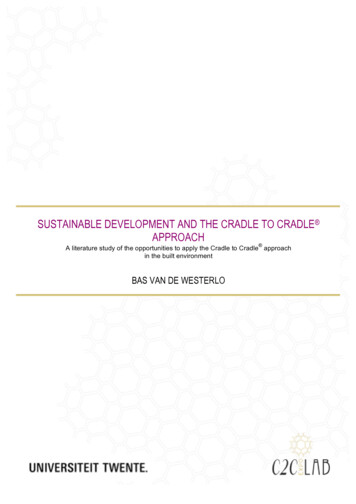
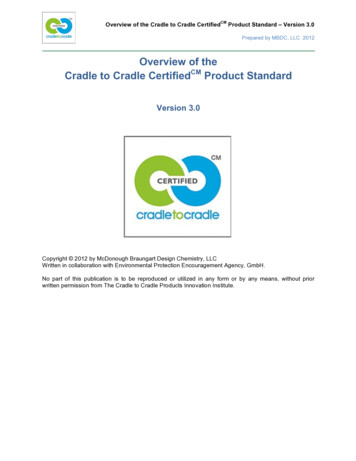

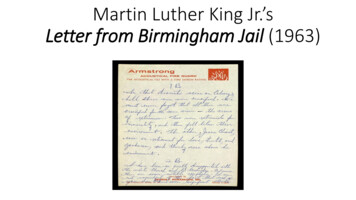
![Letter from Birmingham Jail (1963) [Abridged]](/img/2/1963-mlk-letter-abridged.jpg)
